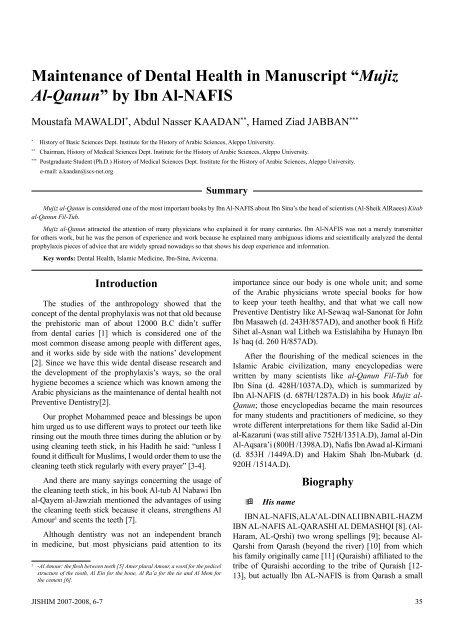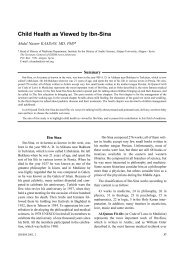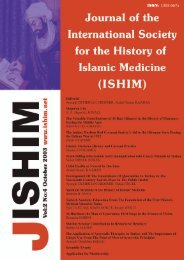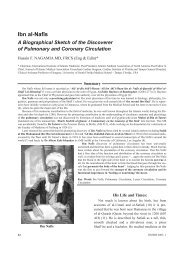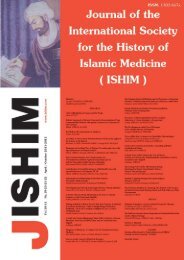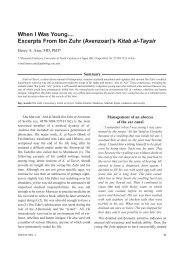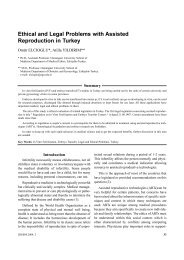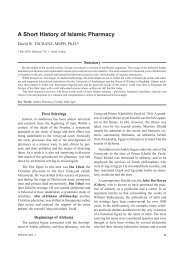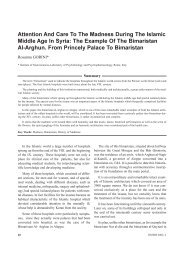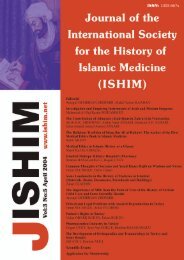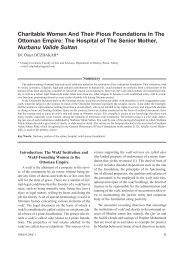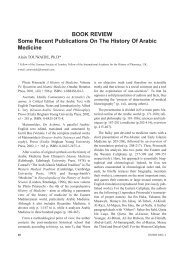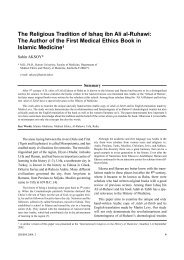Journal of International Society for the History
Journal of International Society for the History
Journal of International Society for the History
You also want an ePaper? Increase the reach of your titles
YUMPU automatically turns print PDFs into web optimized ePapers that Google loves.
Maintenance <strong>of</strong> Dental Health in Manuscript “Mujiz<br />
Al-Qanun” by Ibn Al-NAFIS<br />
Moustafa MAWALDI * , Abdul Nasser KAADAN ** , Hamed Ziad JABBAN ***<br />
* <strong>History</strong> <strong>of</strong> Basic Sciences Dept. Institute <strong>for</strong> <strong>the</strong> <strong>History</strong> <strong>of</strong> Arabic Sciences, Aleppo University.<br />
** Chairman, <strong>History</strong> <strong>of</strong> Medical Sciences Dept. Institute <strong>for</strong> <strong>the</strong> <strong>History</strong> <strong>of</strong> Arabic Sciences, Aleppo University.<br />
*** Postgraduate Student (Ph.D.) <strong>History</strong> <strong>of</strong> Medical Sciences Dept. Institute <strong>for</strong> <strong>the</strong> <strong>History</strong> <strong>of</strong> Arabic Sciences, Aleppo University.<br />
e-mail: a.kaadan@scs-net.org<br />
JISHIM 2007-2008, 6-7<br />
Introduction<br />
The studies <strong>of</strong> <strong>the</strong> anthropology showed that <strong>the</strong><br />
concept <strong>of</strong> <strong>the</strong> dental prophylaxis was not that old because<br />
<strong>the</strong> prehistoric man <strong>of</strong> about 12000 B.C didn’t suffer<br />
from dental caries [1] which is considered one <strong>of</strong> <strong>the</strong><br />
most common disease among people with different ages,<br />
and it works side by side with <strong>the</strong> nations’ development<br />
[2]. Since we have this wide dental disease research and<br />
<strong>the</strong> development <strong>of</strong> <strong>the</strong> prophylaxis’s ways, so <strong>the</strong> oral<br />
hygiene becomes a science which was known among <strong>the</strong><br />
Arabic physicians as <strong>the</strong> maintenance <strong>of</strong> dental health not<br />
Preventive Dentistry[2].<br />
Our prophet Mohammed peace and blessings be upon<br />
him urged us to use different ways to protect our teeth like<br />
rinsing out <strong>the</strong> mouth three times during <strong>the</strong> ablution or by<br />
using cleaning teeth stick, in his Hadith he said: “unless I<br />
found it diffi cult <strong>for</strong> Muslims, I would order <strong>the</strong>m to use <strong>the</strong><br />
cleaning teeth stick regularly with every prayer” [3-4].<br />
And <strong>the</strong>re are many sayings concerning <strong>the</strong> usage <strong>of</strong><br />
<strong>the</strong> cleaning teeth stick, in his book Al-tub Al Nabawi Ibn<br />
al-Qayem al-Jawziah mentioned <strong>the</strong> advantages <strong>of</strong> using<br />
<strong>the</strong> cleaning teeth stick because it cleans, streng<strong>the</strong>ns Al<br />
Amour1 and scents <strong>the</strong> teeth [7].<br />
Although dentistry was not an independent branch<br />
in medicine, but most physicians paid attention to its<br />
1 -Al Amour: <strong>the</strong> fl esh between teeth [5] Amer plural Amour, a word <strong>for</strong> <strong>the</strong> pedicel<br />
structure <strong>of</strong> <strong>the</strong> tooth, Al Ein <strong>for</strong> <strong>the</strong> bone, Al Ra’a <strong>for</strong> <strong>the</strong> tie and Al Mem <strong>for</strong><br />
<strong>the</strong> cement [6].<br />
Summary<br />
Mujiz al-Qanun is considered one <strong>of</strong> <strong>the</strong> most important books by Ibn Al-NAFIS about Ibn Sina’s <strong>the</strong> head <strong>of</strong> scientists (Al-Sheik AlRaees) Kitab<br />
al-Qanun Fil-Tub.<br />
Mujiz al-Qanun attracted <strong>the</strong> attention <strong>of</strong> many physicians who explained it <strong>for</strong> many centuries. Ibn Al-NAFIS was not a merely transmitter<br />
<strong>for</strong> o<strong>the</strong>rs work, but he was <strong>the</strong> person <strong>of</strong> experience and work because he explained many ambiguous idioms and scientifi cally analyzed <strong>the</strong> dental<br />
prophylaxis pieces <strong>of</strong> advice that are widely spread nowadays so that shows his deep experience and in<strong>for</strong>mation.<br />
Key words: Dental Health, Islamic Medicine, Ibn-Sina, Avicenna.<br />
importance since our body is one whole unit; and some<br />
<strong>of</strong> <strong>the</strong> Arabic physicians wrote special books <strong>for</strong> how<br />
to keep your teeth healthy, and that what we call now<br />
Preventive Dentistry like Al-Sewaq wal-Sanonat <strong>for</strong> John<br />
Ibn Masaweh (d. 243H/857AD), and ano<strong>the</strong>r book fi Hifz<br />
Sihet al-Asnan wal Li<strong>the</strong>h wa Estislahiha by Hunayn Ibn<br />
Is`haq (d. 260 H/857AD).<br />
After <strong>the</strong> fl ourishing <strong>of</strong> <strong>the</strong> medical sciences in <strong>the</strong><br />
Islamic Arabic civilization, many encyclopedias were<br />
written by many scientists like al-Qanun Fil-Tub <strong>for</strong><br />
Ibn Sina (d. 428H/1037A.D), which is summarized by<br />
Ibn Al-NAFIS (d. 687H/1287A.D) in his book Mujiz al-<br />
Qanun; those encyclopedias became <strong>the</strong> main resources<br />
<strong>for</strong> many students and practitioners <strong>of</strong> medicine, so <strong>the</strong>y<br />
wrote different interpretations <strong>for</strong> <strong>the</strong>m like Sadid al-Din<br />
al-Kazaruni (was still alive 752H/1351A.D), Jamal al-Din<br />
Al-Aqsara’i (800H /1398A.D), Nafi s Ibn Awad al-Kirmani<br />
(d. 853H /1449A.D) and Hakim Shah Ibn-Mubark (d.<br />
920H /1514A.D).<br />
Biography<br />
� His name<br />
IBN AL-NAFIS, ALA’ AL-DIN ALI IBN ABI L-HAZM<br />
IBN AL-NAFIS AL-QARASHI AL DEMASHQI [8]. (Al-<br />
Haram, AL-Qrshi) two wrong spellings [9]; because Al-<br />
Qarshi from Qarash (beyond <strong>the</strong> river) [10] from which<br />
his family originally came [11] (Quraishi) affi liated to <strong>the</strong><br />
tribe <strong>of</strong> Quraishi according to <strong>the</strong> tribe <strong>of</strong> Quraish [12-<br />
13], but actually Ibn AL-NAFIS is from Qarash a small<br />
35


